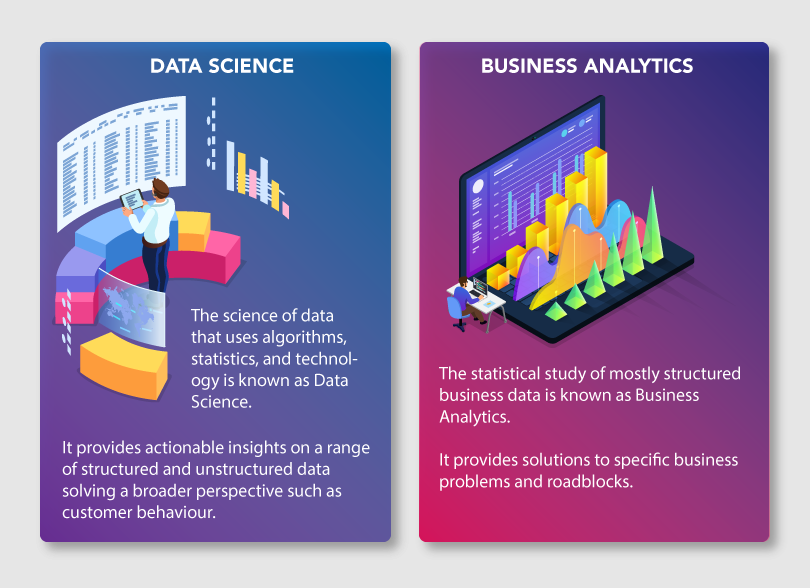
Data Science vs Business Analytics, often used interchangeably, are very different domains. A layman would probably be least bothered with this interchangeability, but professionals need to use these terms correctly as the impact on the business is large and direct. In this article, we will elaborate on the difference between the two.
Simply put, Data science is the study of Data using statistics which provides key insights but not business changing decisions whereas Business Analytics is the analysis of data to make key business decisions for the company.
Difference Between Data Science and Business Analytics
Here are the basic differences between Data Science and Business Analytics
| Data Science | Business Analytics |
| It is the science of Data study using statistics, algorithms and technology | It is the statistical study of business data |
| Uses both structured and unstructured data | Uses mostly structured data |
| It is a combination of traditional analytics practices with sound computer science knowledge including coding | It is oriented more towards statistics and does not involve much coding |
| Top industries where Data Science finds its applications are: a. Technology b. Finance c. E-commerce d. Academic | Top Industries where Business analytics finds its applications are a. Finance b. Technology c. Marketing d. Retail |
| The future applications of Data Science would be witnessed in Artificial Intelligence and Machine Learning | The future applications of Business Analytics would be witnessed in Cognitive Analytics and Tax analytics |
| Data Science results give insights but usually not used for making Business Decisions | Business Analytics results are vital to the key decision makers |
| Studies trends and patterns | Works on specific business problems |
Overview of Data Science and Business Analytics

Data Science and Business Analytics are unique fields, with the biggest difference being the scope of the problems addressed. Simply put, The science of data that uses algorithms, statistics, and technology is known as Data Science. It provides actionable insights on a range of structured and unstructured data solving a broader perspective such as customer behaviour.
On the other hand, the statistical study of mostly structured business data is known as Business Analytics. It provides solutions to specific business problems and roadblocks.
These two terms are interchangeably used in either of the above scenarios, i.e., a business analytics problem could be wrongly addressed to be solved with the help of Data Science. The implications of carelessly using the term ‘Data Science’ in this context could be adverse because the tools and techniques used in Business Analytics are different than Data Science and using wrong tools to assess a data set will yield imperfect and undesirable results.
Data Science is an umbrella term for all things dedicated to mining large data sets. An intersection of programming, statistics, and data analytics, Data Science is not limited to only statistical or algorithmic aspects. Business Analytics is the end-product of data science. It includes two broad categories, that are Statistical Analysis and Business Intelligence.
Business Intelligence
Another term often confused with Data Science is Business Intelligence. It is also an umbrella term that portrays ideas and strategies to improve decision making by utilizing fact-based support systems. Modern Business Intelligence is much beyond just business reporting. It is a mature framework that encompasses intuitive dashboards, mobile analytics, what-if planning, etc. It additionally incorporates enormous back-end machinery for maintaining control around reporting.
Although it sounds similar to Data Science, it is not. The principal difference lies in the type of problems that they address. Business Intelligence deduces the new unknown values of previously known elements using a formula that is already available. On the other hand, Data Science works with unknown scenarios without any formula or algorithm in hand, to solve data queries that nobody has ever answered in the past. Data Science problems are solved by exploring data, finding the best method, building a model around it, and finally operationalizing the model.
Conclusion
Business Intelligence is well established with deep roots in a typical corporate landscape. Corporate professionals are familiar, comfortable, and confident with the BI concepts and framework. As BI projects work on known unknowns, the projects can be planned well in advance and timelines could be efficiently followed. Also, there is minimal trial and error with several successful BI projects in a company’s kitty, who would have developed good project expertise over the years.
There is a massive career scope in the fields of Business Intelligence and Business Analytics. Professionals who are genuinely thinking of making a shift in the BA and Data Science roles can consider upskilling with the right course. Great Learning’s PG program in Data Science & Business Analytics and helps working professionals make a smooth and successful transition. The course offers the choice of online or classroom-based learning with Dual Certificate from University of Texas at Austin, McCombs School of Business (world rank #2 in Analytics), and Great Lakes (India rank #1 in Analytics). It helps you with hands-on practical learning with case studies and projects, without the need of quitting your job. The course is also tailor-made keeping in mind the professionals from the non-IT background. With our career guidance and support, you can easily land your dream job in Business Intelligence and Business Analytics.
If you are looking to upskill in this domain, check out the GL Academy’s free online courses.







